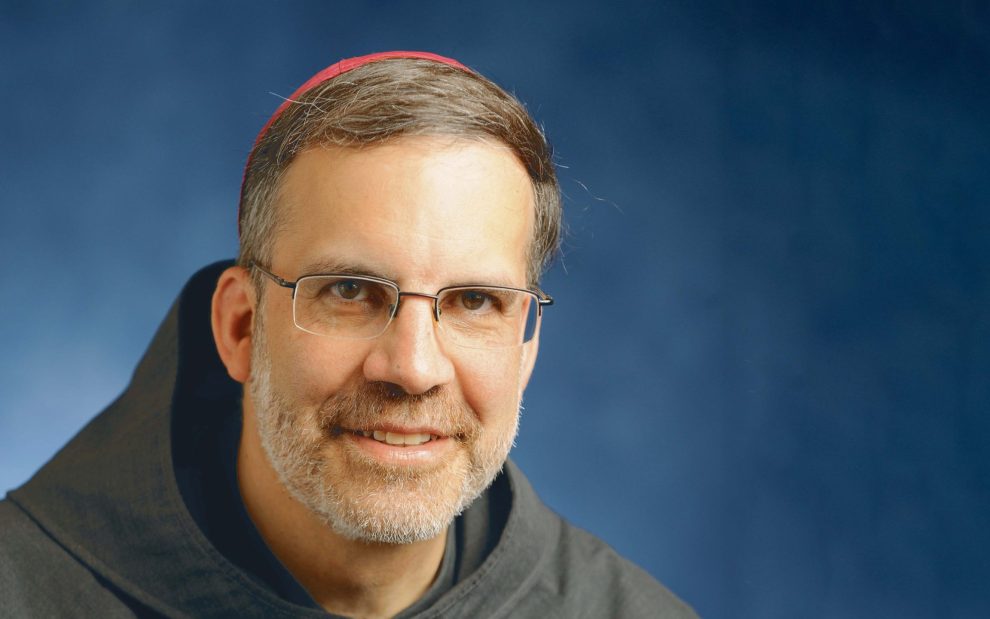The Catholic dioceses in the Appalachia region of Kentucky have a tradition of pastoral letters. While the first two letters were written by the bishops of Appalachia in 1975 and 1995, the third letter, published in 2015, was written by the laity of the region. Called the “people’s pastoral,” it was the result of a substantial number of listening sessions that included diverse voices from people living in the area, including women, Black Catholics, migrants, and LGBTQ people—individuals often left out of conversations within the institutional church.
Bishop John Stowe, O.F.M. Conv. of the Diocese of Lexington says that a history of listening to one another gives his diocese a great example to work from as it participates in what’s being called the “Synod on Synodality,” or the October 2022 Synod of Bishops with the theme “For a synodal church: communion, participation, and mission.” The preparatory proceedings for this gathering will include diocesan and national input on a never-before-seen scale for the Catholic Church. If done right, says Stowe, it could result in significant movement toward the vision of a missionary church which has characterized Pope Francis’ pontificate from the start.
In the United States, Stowe predicts our biggest challenge may also be our greatest gift: the diversity of perspectives and experiences that compose the body of Christ.
How would you describe Pope Francis’ vision for the church?
Pope Francis wants the church to be a missionary church—a church that is not confined in itself but rather active in society. When he says things like the church has to choose mission over maintenance, those are challenging words for us. He’s more direct than some of the previous popes have been about that missionary responsibility.
I think it comes from being the first Latin American pope as well as the first Jesuit pope. The Latin American church really took to heart the creation of regional conferences of bishops and the idea of discerning together. I think for him that has created an ecclesiology that is very strongly rooted in the Second Vatican Council.
Pope Francis advocates discernment and synodality. “Synod” isn’t in our Catholic vocabulary. So first, we have to talk about what it means. We can look at how the Eastern churches are organized around synods—that’s their normal way of operation. We can take the root of the word: It’s about walking together. That requires listening to one another. That’s a challenge for many of us.
The pope really believes all voices have to be heard, and there are a lot of voices right now. It often seems like everybody’s doing the talking and nobody’s doing the listening. When bishops are insulting each other or challenging the motives of each other in public, that’s not going to help build up the church. It’s not going to encourage people to be in a listening or synodal mode.
Pope Francis encourages us to actually hear what one another is saying and then realize that we have to come to some kind of a consensus to move forward. To be a missionary church is not just to preach at people and proclaim the good news but also to encounter them and encounter Christ by doing so. His vision for the church is not that it’s a community of the perfect; it’s pilgrim people on the way. It’s very much the Second Vatican Council’s vision of the church.
How do synods help us achieve this vision?
In 2013 when Pope Francis was new in office, he started talking about the importance of synodality. We’ve seen a number of synods take place in Pope Francis’ time: on the family, on youth, on the Amazon.
His intervention in those synods is important. For example, for the synod on young people he said that we can’t have a synod of bishops about young people without input from youth. So he made sure that there was a listening process on every continent that involved youth. There were questionnaires distributed through the bishops’ conferences in each country. He was deliberate about making sure that non-Catholic, non-Christian, even atheist youth were included in that process. Likewise, he made sure there was representation from families of all different structures for the synod on family.
Now, with the Synod on Synodality, he’s asking each diocese to have a synod that will feed into a continental synod, which will be very interesting because we’ve never done that on a continentwide basis in North America.
As a church, we can get very good at hearing the people in our pews and missing input from people who aren’t, whether they’re Catholics who have been alienated, disaffected, or grown lax in their practice, or they’re people from other denominations. Pope Francis wants us to listen to everybody. All voices have something to contribute.
How do we reach people who aren’t in the pews so they can participate?
That’s a particular challenge. I’m not sure how we’re going to do it, except that we do have good ecumenical relations. So we want to start with other churches. But the people who are completely disaffected, I don’t know.
Maybe somebody would be willing to answer a questionnaire about what the church could be or should be, or what difference it makes.
Where we are, in the Lexington diocese, it’s 50 counties in central and eastern Kentucky. Catholics are 3 percent of the population. So our question is, are we having an impact? Are we proclaiming the good news? Are we living the good news? Are we of service to the community? We get a pretty positive response when we ask that question.
When you’re listening to input from different sources, how do you handle opposing perspectives or contradictory information?
We can name things that are contrary to the gospel or to our tradition. We don’t want to shut off any ideas, but we also don’t want to spend time discussing that which is not going to go anywhere. If there are possibilities and people disagree about those, how do we move forward? It’s going to take some reflection.
If people are hostile in their beliefs, that’s not the Holy Spirit at work. But if I can recognize that someone who disagrees with me has some perspective on the truth, then we can listen to each other and find a way to agree.
In the synod setting, you need skilled facilitators so you can speak boldly and listen charitably—those are hard things to do simultaneously. You also need somebody with the background to say, “This is why the church teaches that. If it’s going to evolve, this is what would be required.”
Pope Francis gave us an example in the synod on the Amazon. Ideas were suggested, and people were disappointed he didn’t respond to them. When asked why he didn’t respond, he said it was because nobody’s position was changed. Everybody came out of the synod with the same attitude they went in with. So he couldn’t say the Holy Spirit was at work there. It wasn’t right yet. It doesn’t mean it was a waste of time. It means we still have to work on things.
A couple of years ago, our diocese went through a pastoral planning period that involved listening sessions in each parish and then each deanery. What we put together as a result of that process is a pastoral plan that is not a document to print out and put on a shelf. Rather, it’s something we’ll keep going back to and asking ourselves how we’re doing in each area and what still needs to be implemented.
That may be hard for us in the United States with our expectation of having things done quickly. It doesn’t necessarily work that way in the church. But I think we do need to show some fruit of this synodal process right away or we’re going to lose interest and participation. And we must have the patience to work through the process.
How do the roles of clergy and laity differ in this synod process?
The hierarchy’s role is leadership. Pope Francis reminds us that means both teaching and listening. To be leaders, sometimes that means walking in front, sometimes it means walking in the midst, and sometimes it means walking behind. So there are different roles for the leadership within that.
The role of the laity is to bring the good news outside of the church’s structure and our physical places of worship—into homes, families, workplaces, and society. The laity goes much further than any of us in the clergy are able to go.
People should ask themselves: Where do we live this vocation? Where do we live the gospel? Priests and bishops need to listen to the laity because their experiences in homes, families, marriages, and workplaces are going to be different from the experiences of clergy. The laity are living in a whole different context, but it’s also part of the church. It’s part of our vital understanding of what it is to be the body of Christ.
We all must be in this together. We must be walking together.
Since this will be a countrywide process, what if I like what the bishop three states over is saying better than what the bishop is saying in my diocese?
There’s a richness in listening to voices from different regions than our own, but at the same time it presents a challenge. We can be uncritical and unreflective about why we’re reading certain things and why we care what certain people say.
Do I take the time to understand why my bishop is saying something different than that bishop? What is different about our circumstances and their circumstances? Are they just two different perspectives on the same truth, or are they radically opposed to each other?
Why do I like this one better than that one? Is it based on the gospel? Is it close to how I understand what Christ was teaching and the tradition of the church? Is it because it fits my political views? Am I trying to be a faithful member of the church and open to what the Holy Spirit is saying? Am I trying to understand better, or am I looking for affirmation of what I already believe?
What are some top priorities you see for the U.S. church?
Youth and young adults came up as a priority in every single one of our pastoral plan listening sessions. We’re just not reaching that population, or, if we are, we don’t have a convincing message. We’re too stuck in the ways that we’ve always done things. It’s not inviting to them. A real emphasis on outreach to youth and young adults is critical.
It also makes sense for Hispanic ministries to be a priority. It’s the only portion of the church that’s growing. More than half of U.S. Catholics between the ages of 14 and 29 are Latino/a. They bring a cultural difference, even if they’re not Spanish speaking, even if they were born in this country. There’s a faith component that is passed down through Latino/a culture that should be recognized and celebrated.
In our diocese, we also have a growing number of Catholic Congolese refugees. After living for years in a refugee camp and then being transported to this place in the middle of Kentucky, they arrive bewildered. Many have never experienced cold like this before and don’t know how to work a heating system. The food in our grocery stores is different than what they’re used to.
No matter what, a priority should be just to accompany people, to walk with people. Our point of connection is our Catholic faith.
How will we know when we have achieved Pope Francis’ vision or are at least making progress?
We have to go back to the image of the pilgrim church. We’re not expecting to arrive at the kingdom of God in this process, but we should get closer.
We need measurable goals. For our diocese during our pastoral plan discussions, we talked about Hispanic ministry. If we have 26 places where Mass is celebrated in Spanish, how many of those places have a priest who’s competent enough in Spanish to hear confessions and give counsel to and dialogue with people in their native language? What do we do to enhance that? For the places that don’t have Mass in Spanish, is there a need for one?
I’m pleased that many priests have stepped up that had minimal understanding of Spanish and have been willing to learn by trial and error, take courses, and learn about pronunciation. We’ve also brought in priests and seminarians from Latin America because people need to hear native speakers.
We’ve partnered with the University of Notre Dame and their Camino program to provide training for lay ministry. We’re on the verge of starting a Spanish language diaconate formation program for native Spanish speakers. A permanent deacon in our diocese, who has many years of experience working in Latin America, has used his own family funds to create a center for Hispanic ministry. It’s a thriving place that has drawn in people with medical, legal, and social work backgrounds to provide holistic care for the people of the community.
We make progress when we take discipleship seriously and realize that to share our faith is not to preach at anybody but to truly encounter them and share the life of Christ with them in ways that are real and convincing. We make progress when we recognize our diversity is not a threat but a great gift.
This article also appears in the February 2022 issue of U.S. Catholic (Vol. 87, No. 2, pages 28-31). Click here to subscribe to the magazine.
Image: Bill Straus













Add comment